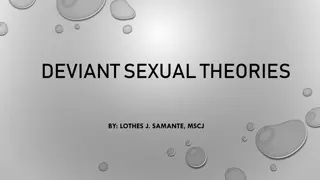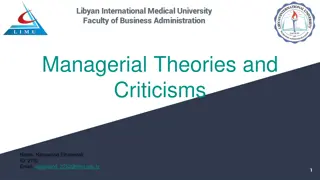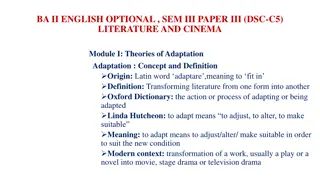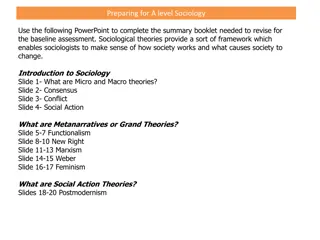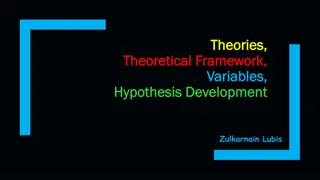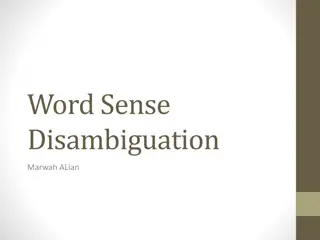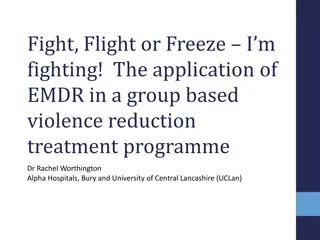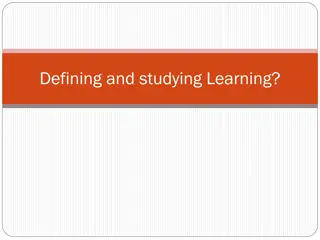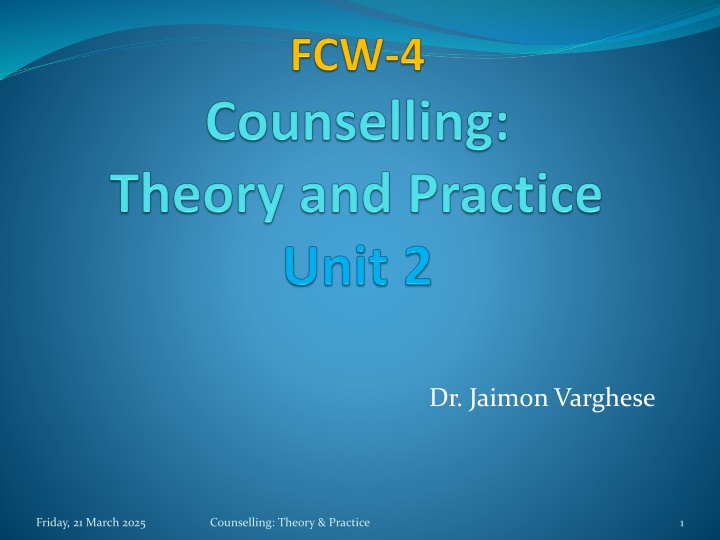
Counselling Theories and Practices for Effective Support
Explore the theories of personality by Freud, Adler, and Erikson, as well as different counselling approaches and the role of the counsellor in psychoanalysis. Develop holistic insights, skills, and competencies in counselling for varied situations.
Download Presentation

Please find below an Image/Link to download the presentation.
The content on the website is provided AS IS for your information and personal use only. It may not be sold, licensed, or shared on other websites without obtaining consent from the author. If you encounter any issues during the download, it is possible that the publisher has removed the file from their server.
You are allowed to download the files provided on this website for personal or commercial use, subject to the condition that they are used lawfully. All files are the property of their respective owners.
The content on the website is provided AS IS for your information and personal use only. It may not be sold, licensed, or shared on other websites without obtaining consent from the author.
E N D
Presentation Transcript
Dr. Jaimon Varghese Friday, 21 March 2025 Counselling: Theory & Practice 1
Learner Objectives 1. Develop holistic understanding of counselling as a tool for help 2. Acquire knowledge, skills and attitudes for counselling 3. Develop insight in need and areas of counselling in different situations 4. To develop counselling competencies in students for working in various specialized set ups Friday, 21 March 2025 Counselling: Theory & Practice 2
Unit - 2 Theories and approaches in counselling Theories of personality and their significance for counselling Sigmund Freud Alfred Adler Erikson Friday, 21 March 2025 Counselling: Theory & Practice 3
Unit - 2 Theories and approaches in counselling Approaches in counselling theoretical base, thrust, goals, key concepts and techniques Person Cantered Rational Emotive Behavioural Therapy Transactional analysis Egan s approach Eclectic approach Friday, 21 March 2025 Counselling: Theory & Practice 4
Unit - 2 Theories in counselling Theories of personality and their significance for counselling Sigmund Freud Alfred Adler Erikson Friday, 21 March 2025 Counselling: Theory & Practice 5
Theories of personality and their significance for counselling - Sigmund Freud Freudian theory of personality topography theory of mind (conscious, sub conscious & unconscious) structure of personality (id, ego & super ego) theory of psycho sexual development (dynamic development) Friday, 21 March 2025 Counselling: Theory & Practice 6
Role of the Counsellor in psycho analysis Encourage clients to talk about whatever comes to their mind - childhood experiences. Create an atmosphere in which the client feels free to express difficult thought. Let clients gain insight by relieving and working through the unresolved past experiences Friday, 21 March 2025 Counselling: Theory & Practice 7
Role of the Counsellor in psycho analysis The development of transference is encouraged to help clients deal realistically with counsellor to interpret for the client. Psychological test, especially projective tests such as Rorschach inkblots, etc is used Friday, 21 March 2025 Counselling: Theory & Practice 8
Goals of psychoanalytic counselling To make unconscious thoughts and memories conscious. To reconstruct the basic personality of a client. To assist clients in reliving earlier experiences and working through repressed conflicts. To achieve intellectual and emotional awareness. Friday, 21 March 2025 Counselling: Theory & Practice 9
Techniques of psychoanalytic counselling Free Association Analysis of Resistance Analysis of transference Analyst s interpretations Analysis of Dreams Friday, 21 March 2025 Counselling: Theory & Practice 10
Strengths of psychoanalytic counselling importance of sexuality and the unconscious based on case histories Supports several diagnostic instruments reflects the complexity of human nature Helped development of ego psychology Friday, 21 March 2025 Counselling: Theory & Practice 11
Strengths of psychoanalytic counselling effective for hysteria, narcissism, obsessive-compulsive reactions, character disorders, anxiety, phobias, and sexual difficulties importance of developmental stages Thematic Apperception Test or the Rorschach Ink Blots, are rooted in psychoanalytic theory Friday, 21 March 2025 Counselling: Theory & Practice 12
Limitations of psychoanalytic counselling Time consuming and expensive. The approach does not seem to lend itself to working with older clients. Based on many concepts not easily communicated or understood. These concepts not only are difficult to test but also have inadequate evidence for their existence. Friday, 21 March 2025 Counselling: Theory & Practice 13
Limitations of psychoanalytic counselling Overemphasis on biology and unconscious forces Sexism Lack of Cross-cultural support The approach is deterministic. Counsellors and psychologists have had a difficult time getting extensive training in psychoanalysis. Friday, 21 March 2025 Counselling: Theory & Practice 14
Theories of personality and their significance for counselling - Alfred Adler View of Human Nature (Adlerian Theory) Rather than being motivated by instinctual drives, humans are motivated by social and interpersonal factors. Conscious aspects of behaviour, rather than the unconscious are central to the development of personality. Friday, 21 March 2025 Counselling: Theory & Practice 15
Theories of personality and their significance for counselling - Alfred Adler View of Human Nature (Adlerian Theory) Individual Psychology The important concepts of Adlerian counselling are family constellation and environment, striving for superiority and social interest and life style. Friday, 21 March 2025 Counselling: Theory & Practice 16
Role of the Adlerian Counsellors Adlerian counsellors function primarily as diagnosticians, teachers, and models in the equalitarian relationships they establish with their clients. They try to assess why clients are oriented to a certain way of thinking and behaving. The counsellor makes an assessment by gathering information on the family constellation and a client s earliest memories. Friday, 21 March 2025 Counselling: Theory & Practice 17
Role of the Adlerian Counsellors The counsellor then shares interpretations, impressions, opinions, and feelings with the client and concentrates on promoting the therapeutic relationship. The client is encouraged to examine and change a faulty life-style by developing social interests. Friday, 21 March 2025 Counselling: Theory & Practice 18
Goals of the Adlerian Counselling The goals of Adlerian counselling revolve around helping people develop healthy life styles as well as helping them overcome feelings of inferiority. One of the major goals of Adlerian counselling is to encourage clients to cultivate social interests. Friday, 21 March 2025 Counselling: Theory & Practice 19
Goals of the Adlerian Counselling Adlerian counsellors stress three goals of the therapeutic process: Establishment and maintenance of an egalitarian counselling relationship. Interpretation of client s life style in a way that promotes insight. Reorientation and re-education of the client with accompanying behaviour change. Friday, 21 March 2025 Counselling: Theory & Practice 20
Techniques of the Adlerian Counselling Confrontation: examine own private logic Asking the question: What would be different if you were well? Encouragement for making productive life-style choices Acting as if they are the persons they want to be for instance, the ideal persons they see in their dreams. Friday, 21 March 2025 Counselling: Theory & Practice 21
Techniques of the Adlerian Counselling Task setting: initially set short range, attainable goals and eventually work up to long-term, realisticobjectives. Push Button: have choices about what stimuli in their lives they pay attention to; can choose to remember negative or positive experiences. Friday, 21 March 2025 Counselling: Theory & Practice 22
Strengths of the Adlerian Counselling equalitarian atmosphere Versatile counselling models for working with children, adolescents, parents, entire families, teacher groups, etc. useful to treat conduct disorders, antisocial disorders, anxiety disorders, affective and personality disorders contributes to public s knowledge such as inferiority complex Friday, 21 March 2025 Counselling: Theory & Practice 23
Limitations of the Adlerian Counselling lacks firm, supportive research base vague in regard to some concepts like social interest, fictional finalism, etc. too optimistic about human nature It does not consider other important life dimensions like power and unconscious Friday, 21 March 2025 Counselling: Theory & Practice 24
Theories of personality and their significance for counselling - Erikson 8 Stage theory on psycho social development Modified psychoanalytic theory Friday, 21 March 2025 Counselling: Theory & Practice 25
Significant relations Psychosocial virtues Maladaptations /malignancies sensory distortion, withdrawal impulsivity, compulsion ruthlessness, inhibition narrow virtuosity, inertia Age Psychosocial crisis Psychosocial modalities 0-1, Infant trust vs mistrust mother to get, to give in return hope, faith autonomy vs shame and doubt will, determination purpose, courage 2-3, Toddler parents to hold on, to let go 3-6, Preschooler initiative vs guilt family to go after, to play 7-12, School-age child industry vs inferiority neighborhood and school to complete, to make things together competence 12-18, Adolescent ego-identity vs role- confusion peer groups, role models to be oneself, to share oneself fanaticism, repudiation fidelity, loyalty 20-45, Young adult intimacy vs isolation to lose and find oneself in another promiscuity, exclusivity partners, friends love 30-65, Middle aged adult generativity vs self- absorption integrity vs despair mankind or 'my household, co- workers to make actual, to take care of to be, through having been, to face not being over extension, rejectivity care 50+, Old adult wisdom presumption despair kind' Friday, 21 March 2025 Counselling: Theory & Practice 26
Eriksons counselling theory Role of counsellors: facilitator for normal development Goals of counselling: resolve development crisis Techniques: psychoanalysis Strength: emphasis on psychosocial dev. Limitations: undue stress on childhood exp. & determinism Friday, 21 March 2025 Counselling: Theory & Practice 27
Approaches in counselling theoretical base, thrust, goals, key concepts and techniques Person Cantered Rational Emotive Behavioural Therapy Transactional analysis Egan s approach Eclectic approach Friday, 21 March 2025 Counselling: Theory & Practice 28
Approaches in counselling Person Cantered Carl Rogers in 1940s and 1950s in reaction to the traditional, highly diagnostic, probing, and interpretive methods of psychoanalysis Client Centred Therapy (1951) On Becoming a Person (1961) Friday, 21 March 2025 Counselling: Theory & Practice 29
Person Centred Approach theoretical base, thrust & key concepts A belief in the dignity and worth of each individual A phenomenological world of the client A belief that people are good and trustworthy. deceit, hate, and cruelty arise out of a defensiveness that alienate individuals from their inherent nature Friday, 21 March 2025 Counselling: Theory & Practice 30
Person Centred Approach theoretical base, thrust & key concepts A tendency toward self actualization: growth, health, adjustment, socialization, self-realization and autonomy importance of the quality of the relationship between client & therapist. therapist as the creator of a facilitative environment that would allow the client to move toward self-growth Friday, 21 March 2025 Counselling: Theory & Practice 31
Person Centred Approach goals "as if approach to counselling: If certain conditions exist, then a definable process is set in motion, leading to certain changes in the client's personality and behaviour. once the proper conditions for growth is established, the client will be able to gain insight and take positive steps toward solving personal difficulties. Friday, 21 March 2025 Counselling: Theory & Practice 32
Person Centred Approach Conditions for Growth Unconditional positive regard without danger of rejection or condemnation Empathic understanding of client s thoughts, feelings, and meanings from the client s own perspective Congruence: counsellor is authentic, genuine, present and transparent to the client Friday, 21 March 2025 Counselling: Theory & Practice 33
Person Centred Approach Techniques The "techniques" are simply ways of expressing and communicating an attitude; self is used as an instrument ways of expressing and communicating genuineness, unconditional positive regard and empathic understanding in such a way that the client knows that the therapist is attempting to fully understand the client's internal frame of reference Friday, 21 March 2025 Counselling: Theory & Practice 34
Person Centred Approach Strengths Revolutionized the counselling profession demystifying it Provision of facilitative environment Empowering clients: leaving responsibility; recognizes their own power over themselves Applicable to maladjustment, inter personal issues, mild to moderate anxiety, frustration, tolerance, uncomplicated bereavement, and defensiveness Friday, 21 March 2025 Counselling: Theory & Practice 35
Person Centred Approach Weaknesses Approach without clearly defined terms and techniques Clients often fail to understand what the counsellor is trying to accomplish Ignores diagnosis and unconsciously generated impulses. Friday, 21 March 2025 Counselling: Theory & Practice 36
Person Centred Approach Weaknesses Deals only with surface issues. Deals only with bright, insightful and hard working clients less effective with these clients: resistant, limited contact with reality, or who have difficulty communicating. Friday, 21 March 2025 Counselling: Theory & Practice 37
Rational Emotive Behavioural Therapy - theoretical base, thrust & key concepts There is nothing either good or bad but thinking makes it so how people think largely determines how they feel and behave every bad feeling you have is the result of your distorted negative thinking Friday, 21 March 2025 Counselling: Theory & Practice 38
Rational Emotive Behavioural Therapy - theoretical base, thrust & key concepts people are both inherently rational and irrational, sensible and crazy this duality is biologically inherent and is perpetuated unless a new way of thinking is learned Ellis (1962) lists 11 common irrational beliefs that can be quite disturbing Friday, 21 March 2025 Counselling: Theory & Practice 39
Rational Emotive Behavioural Therapy - theoretical base, thrust & key concepts 11 common irrational beliefs I must be perfect or no one will love me ! I must be thoroughly competent, adequate, and successful in all possible respects if I am to be worthwhile . It is horrible when things do not turn out the way I want them to . Some people are bad, wicked or villainous, and they should be punished . Friday, 21 March 2025 Counselling: Theory & Practice 40
Rational Emotive Behavioural Therapy - theoretical base, thrust & key concepts 11 common irrational beliefs Unhappiness is a function of events and outside the control of the individual . If something may be dangerous or harmful, an individual should constantly concerned and think about it . It is easier to run away from difficulties and self-responsibility than it is to face them . Individuals need to be dependent on others and have someone stronger than themselves to lean on . Friday, 21 March 2025 Counselling: Theory & Practice 41
Rational Emotive Behavioural Therapy - theoretical base, thrust & key concepts 11 common irrational beliefs Past events in an individual s life determine present behaviour and cannot be changed . An individual should be very concerned and upset by other s problems . There is always a correct and precise answer to every problem and it is catastrophic if not found . Friday, 21 March 2025 Counselling: Theory & Practice 42
Rational Emotive Behavioural Therapy - theoretical base, thrust & key concepts Role of counsellors:instructors who teach and correct the client s cognition Bright Knowledgeable Empathetic Persistent Scientific Interested in helping others themselves users of RET Friday, 21 March 2025 Counselling: Theory & Practice 43
Rational Emotive Behavioural Therapy - goals helping people realize that they can live more rational and productive lives. help people change self-defeating habits of thoughts or behaviour. teaching clients ABCs of human behaviour. Friday, 21 March 2025 Counselling: Theory & Practice 44
Rational Emotive Behavioural Therapy - goals ABCs of human behaviour 'A refers to whatever started things off: a circumstance, event or experience - or just thinking about something which has happened. This triggers off thoughts ('B ), which in turn create a reaction - feelings and behaviours ('C ). Friday, 21 March 2025 Counselling: Theory & Practice 45
Rational Emotive Behavioural Therapy - Techniques Teaching: feelings are a result of thoughts, not events; self-talk influences emotions Cognitive disputation: challenge the client to prove that his or her response is logical Imaginal disputation Behavioural Disputation Confrontation and Encouragement Friday, 21 March 2025 Counselling: Theory & Practice 46
Rational Emotive Behavioural Therapy - Strengths clear, easily learned, and effective. can easily be combined with behavioural techniques to help clients more fully experience what they are learning. relatively short term, usually lasting. a great deal of literature and research continued to evolve Friday, 21 March 2025 Counselling: Theory & Practice 47
Rational Emotive Behavioural Therapy - Weaknesses cannot be used effectively with individuals who have mental problems or limitations, such as schizophrenics and those with severe thought disorders limited if its practitioners do not combine its cognitive base with more behavioural and emotive techniques Friday, 21 March 2025 Counselling: Theory & Practice 48
Transactional analysis - theoretical base, thrust & key concepts Eric Berne s Games People Play (1964) Thomas Harris s I m OK You re OK (1947) optimistic theory: people can change despite any unfortunate events of the past. anti-deterministic: people have choices in their lives, that what was decided can be redefined at a later date Friday, 21 March 2025 Counselling: Theory & Practice 49
Transactional analysis - theoretical base, thrust & key concepts Structured analysis: Understanding what is happening within the individual. Transactional analysis: describing what happens between two or more people. Game analysis: understanding transactions between individuals that lead to bad feelings. Script analysis: understanding the life plan that an individual is following Friday, 21 March 2025 Counselling: Theory & Practice 50

